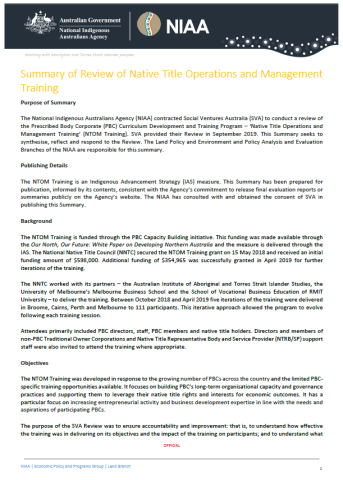Summary of the Review of Native Title Operations and Management Training
The Native Title Operations and Management Training (NTOM Training) is a training program for Prescribed Bodies Corporate (PBCs) and related personnel. The purpose of the training is to build PBCs long-term organisational capacity and governance practices, and support PBCs to leverage their native title rights and interests. The National Native Title Council was funded from the Indigenous Advancement Strategy (administered by the National Indigenous Australian’s Agency (NIAA)) to develop and deliver this training. The NIAA engaged Social Ventures Australia to independently review the NTOM training and its delivery.
Purpose of Summary
The National Indigenous Australians Agency (NIAA) contracted Social Ventures Australia (SVA) to conduct a review of the Prescribed Body Corporate (PBC) Curriculum Development and Training Program – ‘Native Title Operations and Management Training’ (NTOM Training). SVA provided their Review in September 2019. This Summary seeks to synthesise, reflect and respond to the Review. The Land Policy and Environment and Policy Analysis and Evaluation Branches of the NIAA are responsible for this summary.
Publishing Details
The NTOM Training is an Indigenous Advancement Strategy (IAS) measure. This Summary has been prepared for publication, informed by its contents, consistent with the Agency’s commitment to release final evaluation reports or summaries publicly on the Agency’s website. The NIAA has consulted with and obtained the consent of SVA in publishing this Summary.
Background
The NTOM Training is funded through the PBC Capacity Building initiative. This funding was made available through the Our North, Our Future: White Paper on Developing Northern Australia and the measure is delivered through the IAS. The National Native Title Council (NNTC) secured the NTOM Training grant on 15 May 2018 and received an initial funding amount of $598,000. Additional funding of $354,965 was successfully granted in April 2019 for further iterations of the training.
The NNTC worked with its partners – the Australian Institute of Aboriginal and Torres Strait Islander Studies, the University of Melbourne’s Melbourne Business School and the School of Vocational Business Education of RMIT University – to deliver the training. Between October 2018 and April 2019 five iterations of the training were delivered in Broome, Cairns, Perth and Melbourne to 111 participants. This iterative approach allowed the program to evolve following each training session.
Attendees primarily included PBC directors, staff, PBC members and native title holders. Directors and members of non-PBC Traditional Owner Corporations and Native Title Representative Body and Service Provider (NTRB/SP) support staff were also invited to attend the training where appropriate.
Objectives
The NTOM Training was developed in response to the growing number of PBCs across the country and the limited PBC-specific training opportunities available. It focuses on building PBC’s long-term organisational capacity and governance practices and supporting them to leverage their native title rights and interests for economic outcomes. It has a particular focus on increasing entrepreneurial activity and business development expertise in line with the needs and aspirations of participating PBCs.
The purpose of the SVA Review was to ensure accountability and improvement: that is, to understand how effective the training was in delivering on its objectives and the impact of the training on participants; and to understand what barriers may have prevented the training from reaching its objectives and how it could be improved in the future to overcome those identified barriers.
Methodology
There were several components to the Review, undertaken across five phases. Firstly, the underlying Review questions focused on three key areas: execution, learning outcomes and future delivery. Secondly, SVA used a theory-based approach to consider whether the training achieved pre-identified learning outcomes for the participants. Intended outcomes were documented in a logic model which then informed the focus of the Review and data collection tools. Thirdly, SVA used a mixed methods approach for data collection. The data was then used to assess the extent to which the training achieved its desired aims. This methodology was appropriate given the complex operating environment in which the NTOM Training is delivered. It is important to note that there were limitations to the data collected in relation to learning outcomes, principally that it was self-reported by participants and that the scope of the Review did not allow for longitudinal assessment.
Key Findings
Key findings of the Review include:
- Participants’ knowledge and skills increased, on average, across every area tested at every NTOM Training session. Attending the NTOM Training increased participants’ confidence and capacity to run and grow their PBC.
- Participants identified that meeting people from other PBCs and developing a support network were key benefits of the NTOM Training. Participants strongly agreed that the NTOM Training would be useful for other people in their PBC, particularly directors and staff.
- The format and style of the training broadly suited the needs of the participants who indicated they were very likely to use what they learnt in performing their role in the PBC.
- Key barriers to the NTOM Training achieving its objectives related to funding for travel expenses (which significantly impacted upon attendance) and the appropriateness of content (pace, length, language, and cultural content) for all participants, in light of participant diversity.
- Participants were clear in their feedback that they would like to see the NTOM Training continue.
Importantly, the Review helps both the NIAA and NNTC (and its partners) to continue refining the approach so it is most relevant and worthwhile to participants.
Recommendations
The SVA Review contained two main recommendations:
- Improve barriers to access by further tailoring the offering to the diversity of participants, with a focus on barriers due to travel expenses and appropriateness of content
Consider continuing the NTOM Training, with reference to the training needs of the sector, availability of funds and the support needs of the training provider/s.
